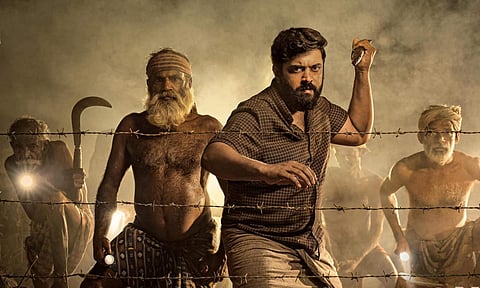Padavettu Movie Review: Ambitious on paper but middling in execution
Rating:(3 / 5)
In the opening scene of Padavettu, we see the protagonist Ravi (Nivin Pauly) holding an iron rod and prepping for something serious. Ravi's neighbour Mohanan (Shine Tom Chacko) and his father, meanwhile, are sharpening a sickle. There's palpable tension suggesting the onset of a fight between the two neighbours. The screen cuts to black. The next morning, we learn that Ravi has smashed a small bridge in his backyard that Mohanan uses to commute. Later, it is revealed that Mohanan and his father were not waiting for Ravi the previous night but for a wild boar that had been damaging their crops. This series of events paint a faint picture of Ravi, the village, its inhabitants, and their problems.
Cast: Nivin Pauly, Shammy Thilakan, Aditi Balan, Remya Suresh
Director: Liju Krishna
Ravi is introduced as a loafer who is looked down on by the villagers. Early on, a revered political leader from the area humiliates Ravi by calling him an "ozhukkil petta potta thenga". Ravi was once the pride of the village but is now a disturbed and cold human. The only person he harbours feelings for is Shyma (Aditi Balan), his ex-lover, who is now a divorcee. Though their relationship remains underexplored in the film, it is interesting how the moments they share are neatly pronounced with long stretches of silent glances and faint smiles.
Ravi lives with his unmarried aunt, Pushpa (Remya Suresh), in a dilapidated house. When her repeated requests to the Panchayat to renovate her house fall on deaf ears, members of the opposition party sense an opportunity to boost their image. The party, headed by their leader Kuyyali (Shammy Thilakan), rebuild their Korothu Veedu and install a plaque in front of the house. It is, of course, the foundation of Kuyyali's elaborate plans to encroach farmlands and master the vulnerable peasants. Ravi, being the hero of the story, resists.
Padavettu is part character study and part socio-political drama. Most of the first half is spent understanding Ravi's psyche. Before his coming-of-age transformation, Ravi is selfish, and least concerned about others. However, a casual conversation with his dad's friend Govindettan (Sudheesh) hints at Ravi's political aspirations. Nivin Pauly excels in a role that is in contrast to his strengths. Ravi is brooding and distressed for the most part. In fact, there's hardly a scene in the entire film where he smiles. The actor shows great control in performance and his physique helps him manoeuvre a new body language.
Towards the end of the first half, keeping in tradition with a typical mass entertainer, emerges an explosive, action-packed interval bang where Ravi vents out all his frustration. From there, the focus shifts to Kuyyali and his deception. It is after this point that the film turns into an ambitious critique of a certain political establishment and its oppressive ways against the farming community. Though the makers have used fictional names for these political parties, you know who the criticisms are directed at and who the narrative sympathises with. These are all intended well, but the problem lies with how these ideas are executed. There are a few scenes like the Sunny Wayne cameo, for instance, that are needlessly hyped, but end up falling flat.
Padavettu's pacing is on the slower side, with the narrative taking its time to unfold and enter into its core plot. Some merciless editing could have made it tighter and more engaging. Take, for instance, the entire sequence with Jaffer Idukki as a sexist veterinary doctor mouthing cheap dialogues; it could have been chopped off in its entirety as it doesn't add any value to the narrative. The film, however, boasts of some other riveting performances. Remya as the hardworking and outspoken Pushpa is brilliant and gets her moment of glory in the climax. Shammy Thilakan as the antagonist, once again, proves his prowess and it is heartening to see the veteran in such powerful roles of late. His Kuyyali is power-hungry, greedy, and scheming, and Shammy Thilakan ensures all of it comes across wonderfully in his performance.
Padavettu is strong in its aesthetics with Govind Vasantha's music being one of the best things about the film. He gets the songs and score spot on understanding both the film's mood and the rich culture of the land it is set in. As director Liju Krishna (who is facing charges of rape and sexual harassment) also hails from the same cultural terrain, he seems to be well aware of the native art forms, some of which he has incorporated into the film as well. The director also shows a lot of promise in scene staging and compositions. When we first see the villain, we see him on an earthmover, towering over his people, and showing tendencies to unscrupulously own the land he sets sights on. In direct contrast, towards the end, we see him once again on top of the earthmover, but this time he is just a pale shadow of himself. Even in a simple scene whose requisite is a casual chat between two characters, we get a frame that is filled with a lot of action in the background. Such creative decisions add authenticity to the proceedings.
Padavettu offers an insightful commentary on sustainable development and calls out political forces that come up with devious schemes to mislead the uninformed. The filmmaker, however, falters in handling the tonal shift when the story metamorphoses from a personal story of one man's coming-of-age to a rather expansive exploration of land politics. The shift is, indeed, jarring.

